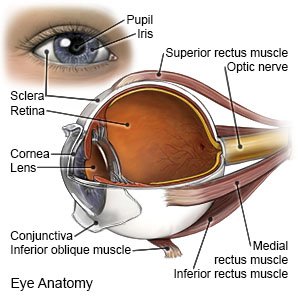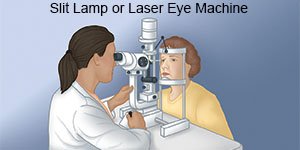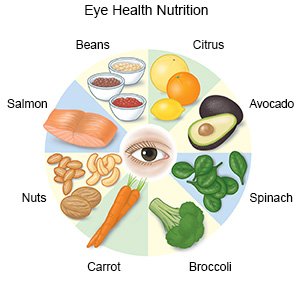Your Vision
Medically reviewed by Drugs.com. Last updated on Aug 4, 2025.
What do I need to know about my vision?
Your vision may change as you age. You can help keep your vision healthy and prevent eye diseases or vision changes.
 |
What increases my risk for vision problems?
- Cigarette, alcohol, or drug use
- Age older than 40
- A medical condition such as diabetes, high blood pressure, or heart disease
- A family history of vision problems
- Exposure to UV rays for long periods of time
- An eye infection or injury
What are warning signs of a vision problem?
- Blurred vision, double vision, or a blind spot in the center of your vision
- Trouble seeing at night
- Trouble seeing things that are held close to your eyes
- Squinting to see something that is more than 20 feet from you
- Black or grey spots in your vision
- Red eyes or eye discomfort or pain
What do I need to know about problems that can affect my vision?
Refractive errors means the eye does not bend light correctly, causing blurry vision. They may happen to adults at any age, but they happen more often with aging. The following are types of refractive errors:
- Farsightedness , or hyperopia, means you have trouble seeing things that are close to you. Presbyopia is a type of farsightedness that happens as you get older.
- Nearsightedness , or myopia, means you have trouble seeing things that are far away.
- Astigmatism is a problem with the curve of your eye's surface. You may not have symptoms, or you may have blurry vision or eye discomfort.
What do I need to know about eye problems that may develop with aging?
- Age-related macular degeneration (AMD) can cause vision loss in one or both eyes. The macula controls what you see at the center of your vision. AMD is caused by the growth of abnormal blood vessels. AMD cannot be cured.
- A cataract is a clouding of the eye's lens. The lens is near the front of the eye. The lens helps focus light to create an image of what you see. Cataracts may affect one or both eyes.
- Glaucoma is an eye disease that causes vision loss in one or both eyes. Glaucoma is caused by fluid buildup behind the eye. This puts pressure on your optic nerve and damages it.
- Retinopathy of diabetes is eye damage caused by high blood sugar levels. The walls of the blood vessels in the retina weaken and leak blood. This causes swelling and vision problems. Over time, new, weak blood vessels grow, leak blood, and damage the center of the retina.
How are vision problems diagnosed?
Early diagnosis and treatment of vision problems or eye diseases may prevent permanent damage. Your healthcare provider will test your vision and examine your eyes with a light. Your provider may put drops in your eyes to make it easier to examine your eyes. Your eye pressure and shape may be checked. You may need to see an ophthalmologist. An ophthalmologist is a specialist who diagnoses and treats eye and vision problems.
 |
How are vision problems treated?
You may need any of the following to treat a vision problem:
- Eyedrops may be given to control glaucoma or prevent macular degeneration from getting worse.
- Glasses or contact lenses (contacts) may help correct nearsightedness, farsightedness, or astigmatism.
- Surgery may be used to correct vision problems. Surgery may also be used to remove a cataract or control macular degeneration.
What can I do to keep my eyes healthy?
- Get an eye exam every 1 to 2 years. Ask your healthcare provider if you need to have an eye exam more often. Early diagnosis and treatment of eye problems may prevent permanent damage.
- Manage high blood pressure, cholesterol, and diabetes. This may decrease your risk for macular degeneration, glaucoma, or cataracts. Follow up with healthcare providers who manage these conditions.
- Wear sunglasses with ultraviolet (UV) light protection. UV light from the sun can damage your eyes and increase your risk for vision loss, cataracts, and macular degeneration. Make sure your ski goggles also have UV protection.
- Wear safety glasses, eye shields, or goggles. These items can prevent eye injury. Make sure the eyewear wraps around the sides of your face. Wear these items while you work with chemicals, metal, wood, or bodily fluids such as blood. Also wear protective eye wear during sports such as racquetball or swimming. Do not use regular eyeglasses for eye protection. They will not protect your eyes.
- Eat foods that contain eye-healthy nutrients. Eye-healthy nutrients include vitamin A, vitamin C, vitamin E, omega-3 fatty acids, lutein, and zeaxanthin. Examples of foods that contain these nutrients include spinach, peanuts, salmon, collard greens, avocados, squash, eggs, and blueberries. Ask your healthcare provider for a full list of foods that contain eye-healthy nutrients. You may also need to take a vitamin or supplement to help you get enough of these nutrients.

- Do not smoke. Chemicals in cigarettes and cigars can cause lung damage. They may also increase your risk for eye problems. Ask your healthcare provider for information if you currently smoke and need help to quit.
- Limit alcohol use. Heavy alcohol use may increase your risk for eye diseases. Ask your healthcare provider if it is okay for you to drink alcohol.
What can I do to prevent computer vision syndrome?
Computer vision syndrome is a condition caused by long periods of time spent on the computer. Symptoms include dry eyes, headache, and blurry vision. The following may help decrease your risk for computer vision syndrome:
- Take breaks. Look at an object 20 feet away from your computer or tablet every 20 minutes. Do this for 20 seconds before you look back at your screen. This can prevent blurry vision, headaches, and tired eyes. Rest your eyes for 15 minutes every 2 hours.
- Blink often. This will help keep your eyes moist and prevent dry eyes.
- Make sure your computer screen is 4 to 5 inches lower than eye level. This will put less stress on your eyes.
- Decrease the glare on your computer screen. This will prevent too much light in your eyes. Keep lights dimmed or positioned away from your screen. Use blinds on windows. You may need to apply an anti-glare screen over your computer. Ask your healthcare provider where to get an anti-glare screen.
When should I seek immediate care?
- You have a sudden change in your vision or complete loss of vision.
- You have an object in your eye.
- Your contact gets stuck in your eye.
- Your eye is bleeding or looks different than usual.
- You have severe eye pain.
When should I call my doctor?
- Your eyelid is swollen.
- Your eyes are sensitive to light.
- You get hit in the eye with an object.
- You have changes in your vision.
- Your eyes are red and draining yellow or white fluid.
- You feel like something is in your eye.
- You have questions or concerns about your condition or care.
Care Agreement
You have the right to help plan your care. Learn about your health condition and how it may be treated. Discuss treatment options with your healthcare providers to decide what care you want to receive. You always have the right to refuse treatment. The above information is an educational aid only. It is not intended as medical advice for individual conditions or treatments. Talk to your doctor, nurse or pharmacist before following any medical regimen to see if it is safe and effective for you.© Copyright Merative 2025 Information is for End User's use only and may not be sold, redistributed or otherwise used for commercial purposes.
Further information
Always consult your healthcare provider to ensure the information displayed on this page applies to your personal circumstances.
